|
|
| |
|
| |

Pioneers in
Arts, Humanities, Science, Engineering, Practice (PAHSEP)
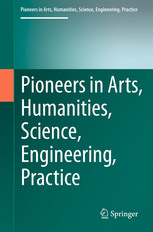
Edited by
Hans Günter Brauch,
AFES-PRESS, chairman
Free University of Berlin (Ret.)
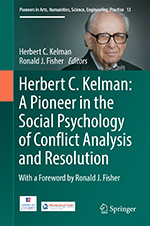
|
Herbert C. Kelman and Ronald J. Fisher (Eds.): Herbert C. Kelman: Pioneer in the Social Psychology of Conflict Analysis and Resolution – Presented by Ronald J. Fisher. Pioneers in Arts, Humanities, Science, Engineering, Practice No. 13 (Cham- New York - Heidelberg - Dordrecht - London: Springer International Publishing, 2017).
ISBN: 978-3-319-39030-7 (Hardcover)
ISBN: 978-3-319-39032-1 (EBook)
Doi: 10.1007/ 978-3-319-39032-1 _ (add chapter no.)
Order this book on Springer Website |
| |
|
|
| |
|
This volume includes selected articles and chapters capturing Herbert Kelman's unique and seminal contributions to the social psychology of conflict analysis and resolution. In these writings, he explores the utility of various social-psychological concepts for understanding violent, intractable conflicts and the implications of this analysis for addressing such conflicts constructively. Central concepts illuminated in this work include perceptual processes, basic human needs, group or normative processes, social and national identity, and intergroup trust. These concepts help to provide the basis and rationale for interactive methods of conflict resolution, such as the problem-solving workshops practiced by Herbert Kelman and other scholar-practitioners. Kelman's cumulative analysis over five decades is well represented in this collection of key texts. The work is highly regarded in the fields of peace studies, conflict resolution, and international relations for its contribution to understanding and transforming destructive and intractable conflict.
On the contents
Ronald J. Fisher: Herbert C. Kelman: An Interdisciplinary Pioneer and Peace Advocate.
Herbert C. Kelman: Personal Reflections on my Work in Conflict Analysis and Resolution – Bibliography – Social-psychological dimensions of international conflict – Applying a human needs perspective to the practice of conflict resolution: The Israeli-Palestinian case – The role of national identity in conflict resolution: Experiences from Israeli-Palestinian problem-solving workshops – Group processes in the resolution of international conflicts: Experiences from the Israeli-Palestinian case.
|
| |
|
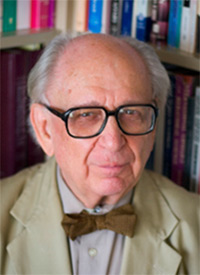
|
Herbert C. Kelman is the Richard Clarke Cabot Professor of Social Ethics, Emeritus, at Harvard University and was (from 1993 to 2003) Director of the Program on International Conflict Analysis and Resolution at Harvard's Weatherhead Center for International Affairs. He received his Ph.D. in Social Psychology from Yale University in 1951. He is past president of the International Studies Association, the International Society of Political Psychology, the Interamerican Society of Psychology, and several other professional associations. He is recipient of many awards, including the Socio-Psychological Prize of the American Association for the Advancement of Science (1956), the Kurt Lewin Memorial award (1973), the American Psychological Association's Award for Distinguished Contributions to Psychology in the Public Interest (1981), the Grawemeyer Award for Ideas Improving World Order (1997), the Austrian Medal of Honor for Science and Art First Class (1998), and the Gold Medal of Honor of the Federal Capital of Vienna (2012).
His major publications include International Behavior: A Social-Psychological Analysis (editor and co-author; 1965), A Time to Speak: On Human Values and Social Research (1968), and Crimes of Obedience: Toward a Social Psychology of Authority and Responsibility (with V. Lee Hamilton; 1989). Since 2011, he has been Honorary President of the Herbert C. Kelman Institute for Interactive Conflict Transformation (Vienna/Jerusalem). He has been engaged for many years in the development of interactive problem solving, an unofficial third-party approach to the resolution of international and intercommunal conflicts, and in its application to the Arab-Israeli conflict, with special emphasis on its Israeli-Palestinian component. |
| |
On the Editor |
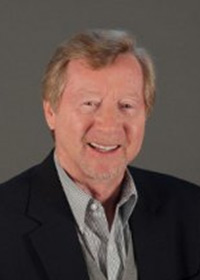 |
Ronald J. Fisher is Professor Emeritus of International Peace and Conflict Resolution in the School of International Service at American University, Washington, DC, a Distinguished Visiting Scholar in the School of Conflict Analysis and Resolution at George Mason University in Arlington, VA, and an Adjunct Professor in the Doctor of Social Sciences Program at Royal Roads University, Victoria, Canada. His primary interest is interactive conflict resolution, which involves informal third party interventions in protracted and violent ethnopolitical conflict. As a scholar, Ron has developed a generic model of third party consultation, an eclectic model of intergroup conflict and a contingency model of third party intervention, and has documented and evaluated a variety of interactive conflict resolution interventions.
His publications include Social Psychology: An Applied Approach (1982), The Social Psychology of Intergroup and International Conflict Resolution (1990), Interactive Conflict Resolution (1997), and Paving the Way: Contributions of Interactive Conflict Resolution to Peacemaking (2005), as well as numerous book chapters and articles in interdisciplinary journals in the peace and conflict resolution field. As a practitioner, he has worked on the longstanding dispute in Cyprus and similar conflicts in other parts of the world, and has provided training and consultation services to a wide range of organizations and institutes. In 2001 he received an Outstanding Contribution Award and in 2003 the Morton Deutsch Conflict Resolution Award from the Peace Psychology Division of the American Psychological Association, and in 2011 he received the Nevitt Sanford Award from the International Society of Political Psychology. Ron holds a B.A. (Hon.) and M.A. in Psychology from the University of Saskatchewan and a Ph.D. in Social Psychology with a minor in International Relations from the University of Michigan, and he has been elected as a Fellow in both the American and Canadian Psychological Associations. |
| |
Important Links on Herbert C. Kelman
Selected Videos with Herbert C. Kelman
- C-Span, Recordings and Videos with Herbert C. Kelman, 1968, 1989, 2004, 2007
- George Mason University, SCAR, Parents of the Field, Herbert C. Kelman
- Conflict resolution and reconciliation: a social-psychological perspective, conferencia de H. Kelman, Universidad Complutense de Madrid, 2010
- Herbert Kelman, Emmanuel College, Boston Study Group on Middle East Peace, Part 2, Spring 2011, Wyant Lecture
- Herbert C. Kelman, Ethics and the Obedience Research 2013 Obedience to Authority Conference Nipissing University
- Herbert C. Kelman - Flucht aus Wien (in German), 2 December 2015
|
| |
Books by Herbert C. Kelman
|
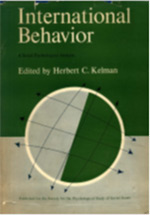 |
Kelman, H.C.
International Behavior: A social-psychological analysis
(New York: Holt, Rinehart and Winston, 1965) |
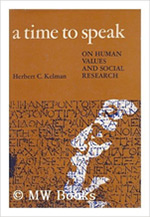 |
Kelman, H.C.
A time to speak:
On human values and social research
(San Francisco, CA: Jossey-Bass, 1968) |
| |
|
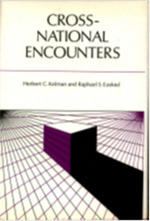 |
Kelman, H.C. and Ezekiel, R.S., with Kelman, R.B.
Cross-national encounters:
The personal impact of an exchange program for broadcasters
(San Francisco, CA: Jossey-Bass, 1970) |
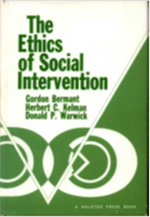 |
Bermant, G., Kelman, H.C., and Warwick, D.P. (Eds.)
The ethics of social intervention
(Washington, DC: Hemisphere Publishing Corporation, 1978) |
| |
|
|
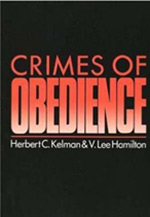 |
Kelman, H.C. and Hamilton, V.L.
Crimes of obedience:
Toward a social psychology of authority and responsibility
(New Haven, CT: Yale University Press, 1989) |
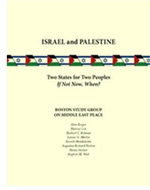 |
Berger, A., Cox, H., Kelman, H.C.,
Martin, L.G., Mendelsohn, E., Norton, A.R.,
Steiner, H., and Walt, S.M.
Israel and Palestine – Two states for two peoples:
If not now, when? (2010) |
| |
|
| |
Werner Wintersteiner, Wilfried Graf (Eds.),
Herbert C. Kelman (Author):
Resolving Deep-Rooted Conflicts:
Essays on the Theory and Practice of
Interactive Problem-Solving
(London: Routledge, 2016) |
|
| |
| |
|

On the Weatherhead Center for International Affairs
The Center for International Affairs was founded in 1958 and was renamed the Weatherhead Center for International Affairs in 1998 in gratitude for the magnificent endowment established by Albert and Celia Weatherhead and the Weatherhead Foundation. The Center was created as a means of confronting the world's condition, a condition diagnosed by Robert Bowie and Henry Kissinger in their gripping The Program of the Center for International Affairs (1958):
Foreign affairs in our era pose unprecedented tasks.…Today no region is isolated; none can be ignored; actions and events even in remote places may have immediate worldwide impact…vast forces are reshaping the world with headlong speed. Under the impact of wars, nationalism, technology, and communism, the old order has been shattered. Empires have crumbled; nations once dominant are forced to adapt to shrunken influence. New nations have emerged and are struggling to survive.…Nowhere do traditional attitudes fit the new realities.…Thus notions of sovereignty and independence need revision to apply to a world where a nation's level of life or survival may depend as much on the actions of other countries as on its own… .
That diagnosis, and the challenges that shaped the Center's vision and mission then, remain pertinent and continue to inform our work today.
The Center is the largest international social science center within Harvard University’s Faculty of Arts and Sciences. The Center is structured to encourage the highest practical level of personal and intellectual interaction among a diverse community of scholars and practitioners. It is distinctive in its recognition that knowledge is a product not only of individual academic research, but also of vigorous, sustained intellectual dialogue among scholars and nonacademic experts. To stimulate this dialogue, the Center sponsors a wide array of seminars, research programs, workshops, and conferences.
Retrieved from http://wcfia.harvard.edu/about and reprinted with the kind permission of the Weatherhead Center for International Affairs, Harvard University, Cambridge, MA, U.S.A.

American University is an independent, coeducational university, chartered by an Act of Congress in 1893 as a Methodist Church–related institution. Our cosmopolitan, multicultural campus enrolls approximately 13,000 students in undergraduate, master’s, doctoral, and professional degree and certificate programs. The university attracts students from all 50 states, the District of Columbia, Puerto Rico and the territories, and 130 countries.
American University offers a wide range of undergraduate and graduate programs through its seven major divisions: College of Arts and Sciences, Kogod School of Business, School of Communication, School of International Service, School of Public Affairs, Washington College of Law, and School of Professional and Extended Studies. The College of Arts and Sciences comprises 21 teaching units, including the School of Education, Teaching, and Health. Each semester approximately 400 students from 200 colleges worldwide participate in programs through AU’s School of Professional and Extended Studies, AU Abroad, and Abroad at AU.
Academic offerings of the university include 68 bachelor’s degrees; 69 master’s degrees; 10 doctoral degrees; JD, LLM, and SJD degrees; and certificate programs. University leaders have assembled a nationally and internationally acclaimed faculty committed to excellence in teaching and scholarship—real wonks in their field— along with a diverse and talented student body. American University’s academic programs are grounded in the arts and sciences and connected to the extraordinary cultural, public affairs, legal, business, international, and communication resources of Washington, DC.
AU will continue to build on these strengths to create a distinctively American, globally oriented university dedicated to academic excellence in preparing students for leadership in a complex international society.
Reprinted with the kind permission of American University, Washington, DC, U.S.A.
American University
American University, School of International Service
International Peace and Conflict Resolution
|
|
|
|
|